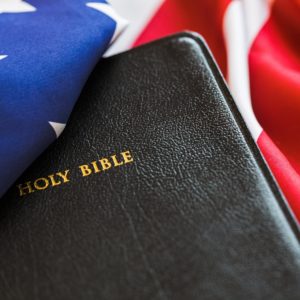Democratic presidential candidates like Sen. Elizabeth Warren, former Rep. Beto O’Rourke and Mayor Pete Buttigieg are spending at least part of their Easter/Passover weekend crisscrossing the key early primary state of New Hampshire, talking about health care, tax policy, and the Mueller report. What are they not talking about?
Easter or Passover. And as far as New Hampshire Democrats, that’s just fine.
According to multiple polls, New Hampshire is one of the most secular states in the country. Only 20 percent of Granite Staters consider themselves “very religious”–the lowest rate in the nation–and only about a quarter attend religious services regularly. A third of New Hampshire residents say they have no religious affiliation at all.
Given the available data, chances are the progressives who make up the Democratic Party’s base in New Hampshire are even more secular than this. So if the primary voters aren’t interested in religious faith, either in a candidate’s personal life or in society at large, why should the candidates talk about it?

Pete Buttigieg in front of Nashua’s City Hall where JFK launched his 1960 presidential campaign.
Steven A. Krueger is president of Catholic Democrats, an organization based in Boston, MA (another extremely secular state) whose mission he describes as “to advance the rich Catholic Social Justice Tradition in the public square and within the Democratic Party.” He tells InsideSources that “even as the number of religiously unaffiliated people increases every year, the American character has stubbornly held on to that part of our national identity formed in faith. Additionally, many Democrats speak of being the party of moral values or of framing issues within a moral context.
“So it is appropriate – if not advisable – for Democratic candidates to let voters know the degree to which their moral values have been formed in their faith and how those values may apply in shaping their public policy positions in our pluralistic society,” Krueger says.
And yet, the only time Catholicism has come up in a significant way during the 2020 race was Sen. Kamala Harris’s suggestion that the Knights of Columbus is a potential hate group whose members should be viewed with suspicion. Will Harris even be asked about her comments while on the campaign trail this Easter weekend?
Kristen Day of Democrats for Life America says her party’s candidates ignore values voters at their peril. “Faithful Democrats helped Obama win in 2008,” she told InsideSources. “He started very early in his campaign to build the coalition of faith leaders and kept the coalition together through his re-election.
“Hillary Clinton, however, did not make the same effort. She didn’t hire a faith outreach director, I believe, until only a few months before the 2016 election. She completely ignored faithful Democrats until much too late,” Day said.
Day also points out that the Hispanic and African-American communities have a large percentage of people of faith, but ironically this highlights why the issue of religion is likely to be sidelined in the Granite State. In addition to being one of the most secular states, it’s also one of the whitest. Black and Hispanic voters combined make up around 6 percent of the population.
Still, in a field divided 19 ways (and with Joe Biden and MA Rep. Seth Moulton entering the race, soon to be 21), wouldn’t it be valuable for one Democrat to appeal directly to these voters? One candidate who speaks openly about his Christian beliefs is Mayor Pete Buttigieg. He attends services regularly at the same Episcopal church where he and his husband were married, and said in a recent interview that Democrats “need to not be afraid to invoke arguments that are convincing on why Christian faith is going to point you in a progressive direction.”
But Buttigieg also supports late-term abortion–an extreme position even among non-religious voters–and has gone out of his way to pick fights on LGBT issues with Vice President Mike Pence. In fact, Buttigieg’s attacks on Pence–who he acknowledges has been nothing but gracious to him–are an attack on all people of faith who oppose same-sex marriage. Buttigieg doesn’t claim Pence is a bigot for his behavior but rather argues that Pence’s faith-based beliefs are homophobic.
Setting aside the debate over theology, Buttigieg’s stance means that every Muslim, Catholic, Evangelical or Orthodox Jew who practices a traditional form of their faith is a hater. It’s hardly an open door to people of faith.
Buttigieg and his fellow candidates are unlikely to be questioned about faith during the Easter weekend because the only people more secular than New Hampshire’s Democratic primary voters are the press.
Still, there are Democrats whose votes will be influenced by their faith. Which is why, Day says, “None of the Democrats should ignore this coalition or take for granted that faithful Democrats will pull the lever for someone who wants to trample on conscience protections and religious freedom.”
But if they’re Democrats who want to defeat Donald Trump, will they have any choice?

